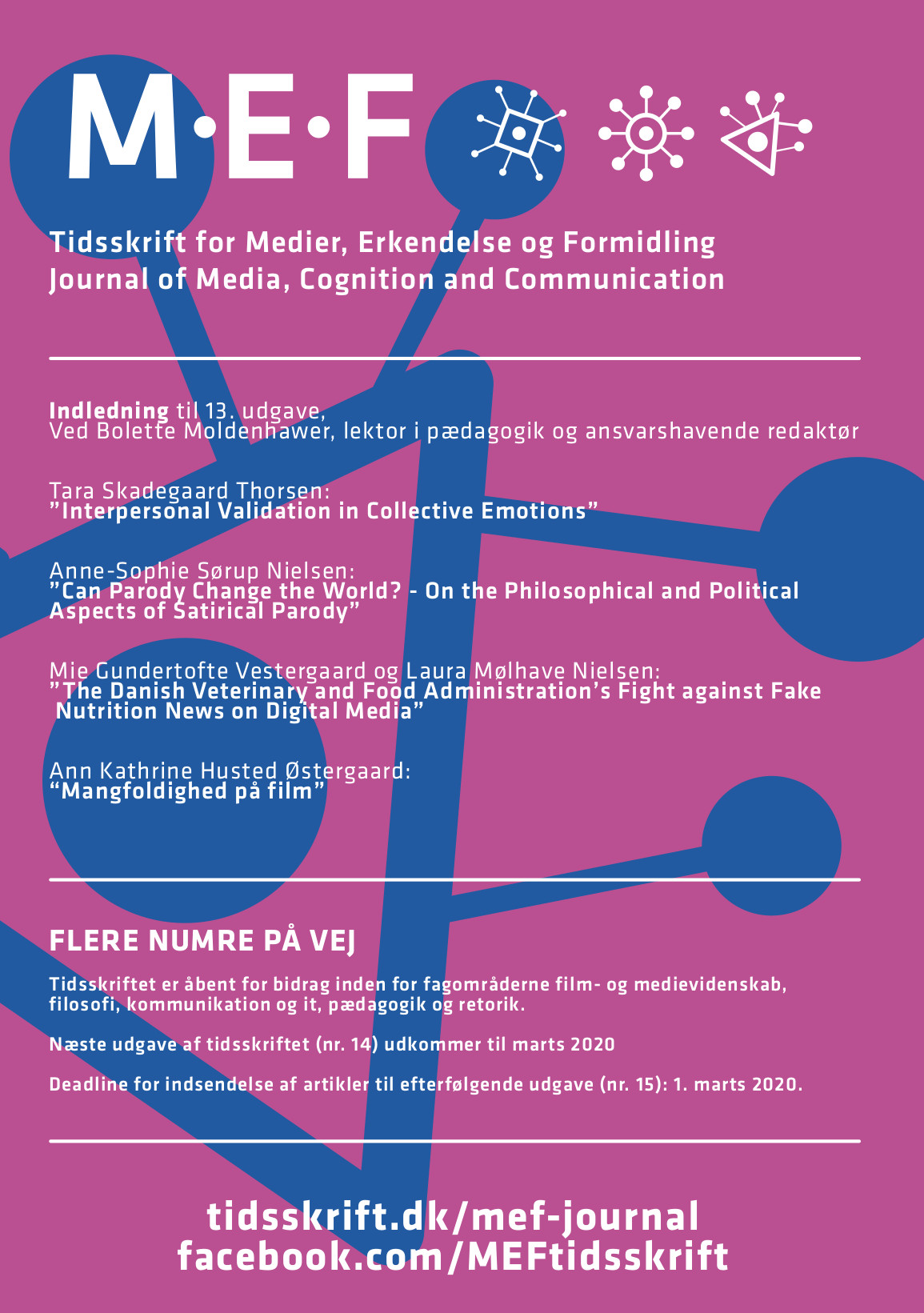Can Parody Change the World?
On the Philosophical and Political Aspects of Satirical Parody
Nøgleord:
parodi, politisk satire, Derrida, dekonstruktionResumé
Satire er i stigende grad med til at forme vores politiske bevidsthed. Men hvad sker der, når politiske emner bliver formuleret igennem satire? Formålet med denne artikel er at undersøge en af de mest udbredte udtryksformer inden for politisk satire, nemlig parodi, med henblik på at afdække parodiens bidrag til satire, samt at foretage en vurdering af parodiens kritiske potentiale. Jeg argumenterer for, at parodi kan forstås som en form for dekonstruktion, og at dens kritiske potentiale ligger i dens evne til at destabilisere politiske antagelser, der bliver taget for givet i vores samfund.
Referencer
Baym, Geoffrey, and Jeffrey P. Jones (Ed.). 2013. News Parody and Political Satire Across the Globe. London & New York: Routledge.
Derrida, Jacques. 1986. “Différance”. In Margins of Philosophy (Bass, Alan, Trans.). Chicago: The University of Chicago Press, pp. 1-29.
Derrida, Jacques. 1988. “The Original Discussion of ‘Différance’ (1968)” (Wood, David et al., Trans.). In Derrida and Différance (Wood, David, and Robert Bernasconi, Ed.). Evanston, Illinois: Northwester University Press, pp. 83-97.
Derrida, Jacques. 1996. “Remarks on Deconstruction and Pragmatism” (Mouffe, Ed.). pp. 77-88.
Derrida, Jacques. 1997. Of Grammatology (Spivak, Gayatri Chakravorty, Trans.). Baltimore & London: The John Hopkins University Press.
Householder Jr., Fred W. 1944. “Parodia”. In Classical Philology, Vol. 39, No. 1. The University of Chicago Press, Jan. pp. 1-9.
Hutcheon, Linda. 1985. A Theory of Parody. New York & London: Methuen.
McClennen, Sophia A., and Remy M. Maisel. 2014. Is Satire Saving Our Nation? - Mockery and American Politics. New York: Palgrave MacMillan.
Morson, Gary Saul. 1981. “Part 1: Theory of Parody”. In The Boundaries of Genre: Dostoevsky’s Diary of a Writer and the Traditions of Literary Utopia. Evanston, Illinois: Northwestern University Press, pp. 107-15.
Mouffe, Chantal (Ed.). 1996. Deconstruction and Pragmatism. London & New York: Routledge.
O’Connor, William van. 1964. “Parody as Criticism”. In College English, Vol. 25, No. 4. National Council of Teachers of English, pp. 241-48.
Phiddian, Robert. 1997. “Are Parody and Deconstruction Secretly the Same Thing?”. In New Literary History, Vol. 28, No. 4, Philosophical Thoughts. The John Hopkins University Press, Autumn, pp. 673-96.
Rose, Margaret A. 1979. Parody//Meta-Fiction. London: Croom Helm Ltd.
Swift, Jonathan. 2018. “A Modest Proposal for Preventing the Children of Poor People from Being a Burthen to their Parents, or Country; and for Making Them Beneficial to the Publick”. In Irish Political Writings after 1725 (D.W. Hayton, and Adam Rounce, Ed.). Cambridge University Press, pp. 143-60.
Zuckert, Catherine. 1991. “The Politics of Derridean Deconstruction”. In Polity, Vol. 23, No. 3. The University of Chicago Press on behalf of the Northeastern Political Science Association, Spring, pp. 335-56.
Derrida, Jacques. 1986. “Différance”. In Margins of Philosophy (Bass, Alan, Trans.). Chicago: The University of Chicago Press, pp. 1-29.
Derrida, Jacques. 1988. “The Original Discussion of ‘Différance’ (1968)” (Wood, David et al., Trans.). In Derrida and Différance (Wood, David, and Robert Bernasconi, Ed.). Evanston, Illinois: Northwester University Press, pp. 83-97.
Derrida, Jacques. 1996. “Remarks on Deconstruction and Pragmatism” (Mouffe, Ed.). pp. 77-88.
Derrida, Jacques. 1997. Of Grammatology (Spivak, Gayatri Chakravorty, Trans.). Baltimore & London: The John Hopkins University Press.
Householder Jr., Fred W. 1944. “Parodia”. In Classical Philology, Vol. 39, No. 1. The University of Chicago Press, Jan. pp. 1-9.
Hutcheon, Linda. 1985. A Theory of Parody. New York & London: Methuen.
McClennen, Sophia A., and Remy M. Maisel. 2014. Is Satire Saving Our Nation? - Mockery and American Politics. New York: Palgrave MacMillan.
Morson, Gary Saul. 1981. “Part 1: Theory of Parody”. In The Boundaries of Genre: Dostoevsky’s Diary of a Writer and the Traditions of Literary Utopia. Evanston, Illinois: Northwestern University Press, pp. 107-15.
Mouffe, Chantal (Ed.). 1996. Deconstruction and Pragmatism. London & New York: Routledge.
O’Connor, William van. 1964. “Parody as Criticism”. In College English, Vol. 25, No. 4. National Council of Teachers of English, pp. 241-48.
Phiddian, Robert. 1997. “Are Parody and Deconstruction Secretly the Same Thing?”. In New Literary History, Vol. 28, No. 4, Philosophical Thoughts. The John Hopkins University Press, Autumn, pp. 673-96.
Rose, Margaret A. 1979. Parody//Meta-Fiction. London: Croom Helm Ltd.
Swift, Jonathan. 2018. “A Modest Proposal for Preventing the Children of Poor People from Being a Burthen to their Parents, or Country; and for Making Them Beneficial to the Publick”. In Irish Political Writings after 1725 (D.W. Hayton, and Adam Rounce, Ed.). Cambridge University Press, pp. 143-60.
Zuckert, Catherine. 1991. “The Politics of Derridean Deconstruction”. In Polity, Vol. 23, No. 3. The University of Chicago Press on behalf of the Northeastern Political Science Association, Spring, pp. 335-56.
Downloads
Publiceret
2019-09-19
Citation/Eksport
Nielsen, A.-S. S. (2019). Can Parody Change the World? On the Philosophical and Political Aspects of Satirical Parody. Tidsskrift for Medier, Erkendelse Og Formidling, 7(2), 18. Hentet fra https://tidsskrift.dk/mef-journal/article/view/112507
Nummer
Sektion
Artikler
Licens
Creative Commons: CC by-nc-nd


